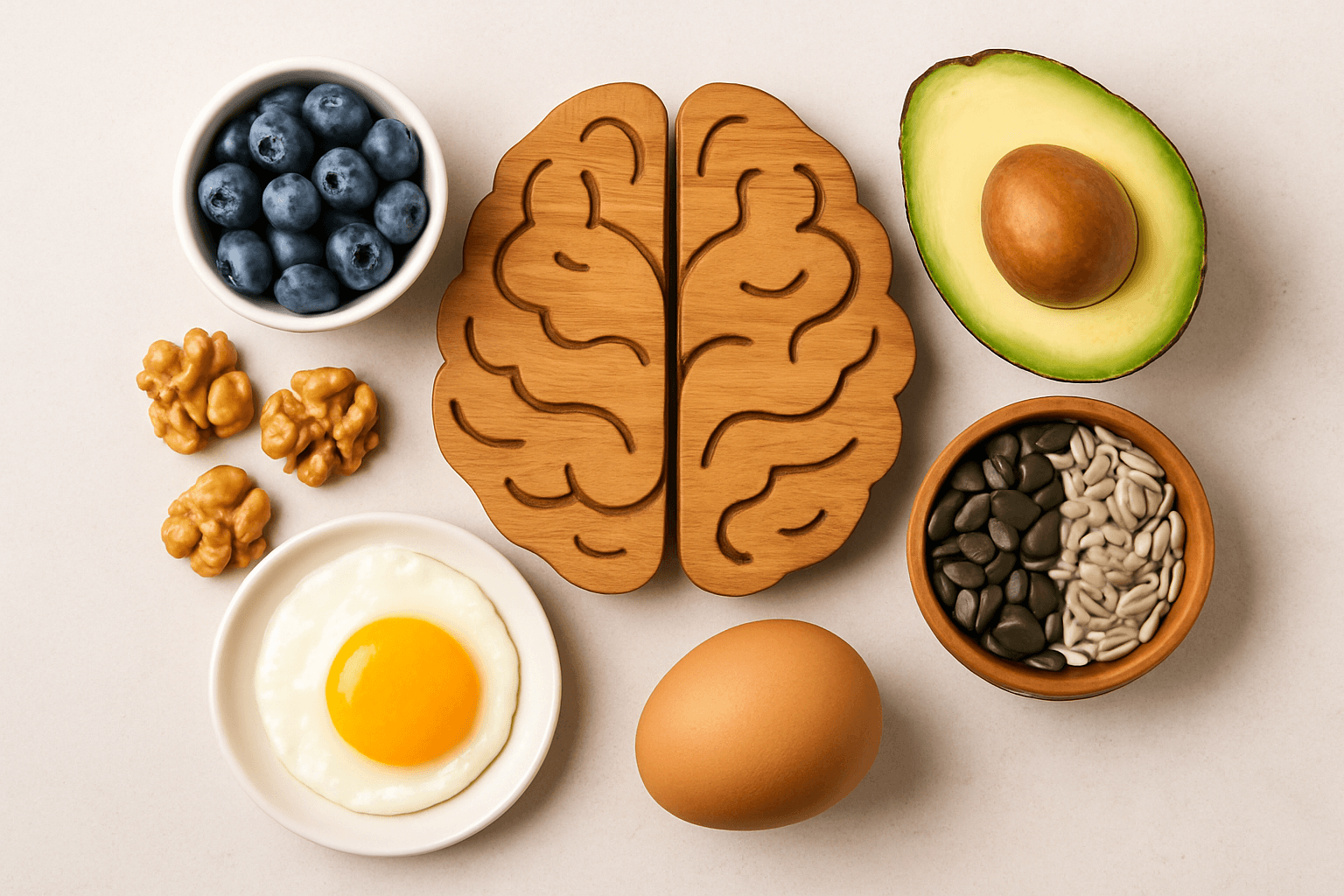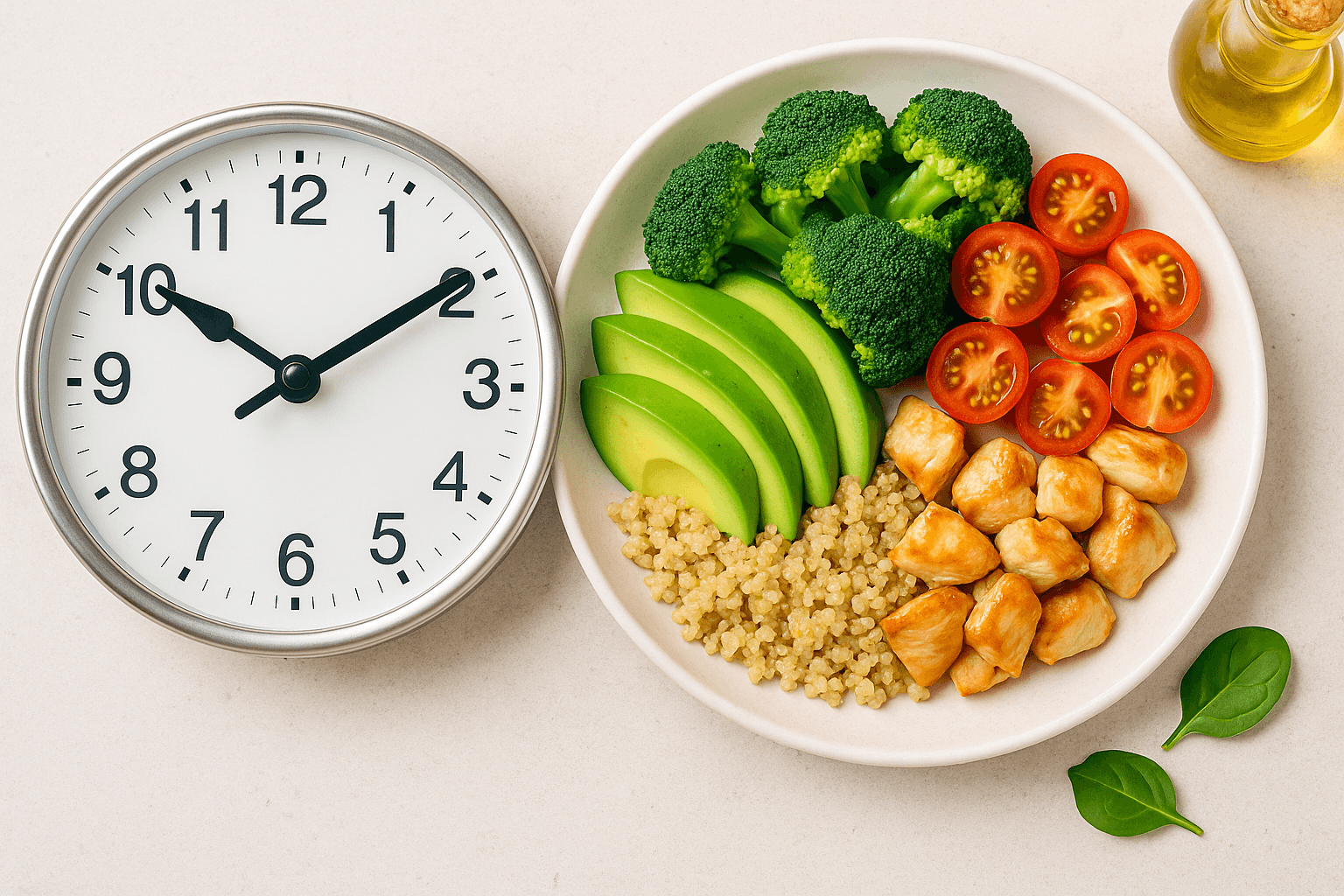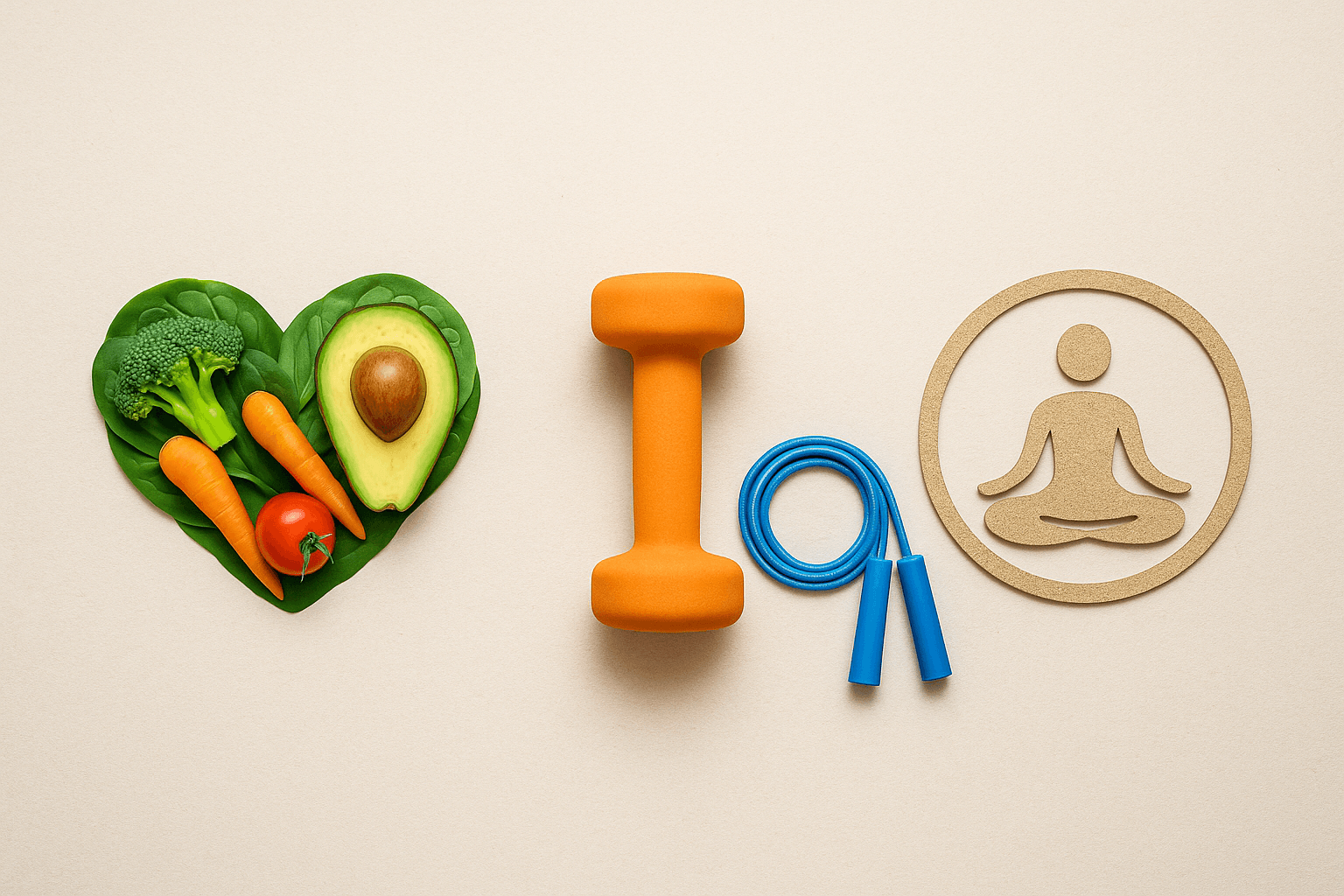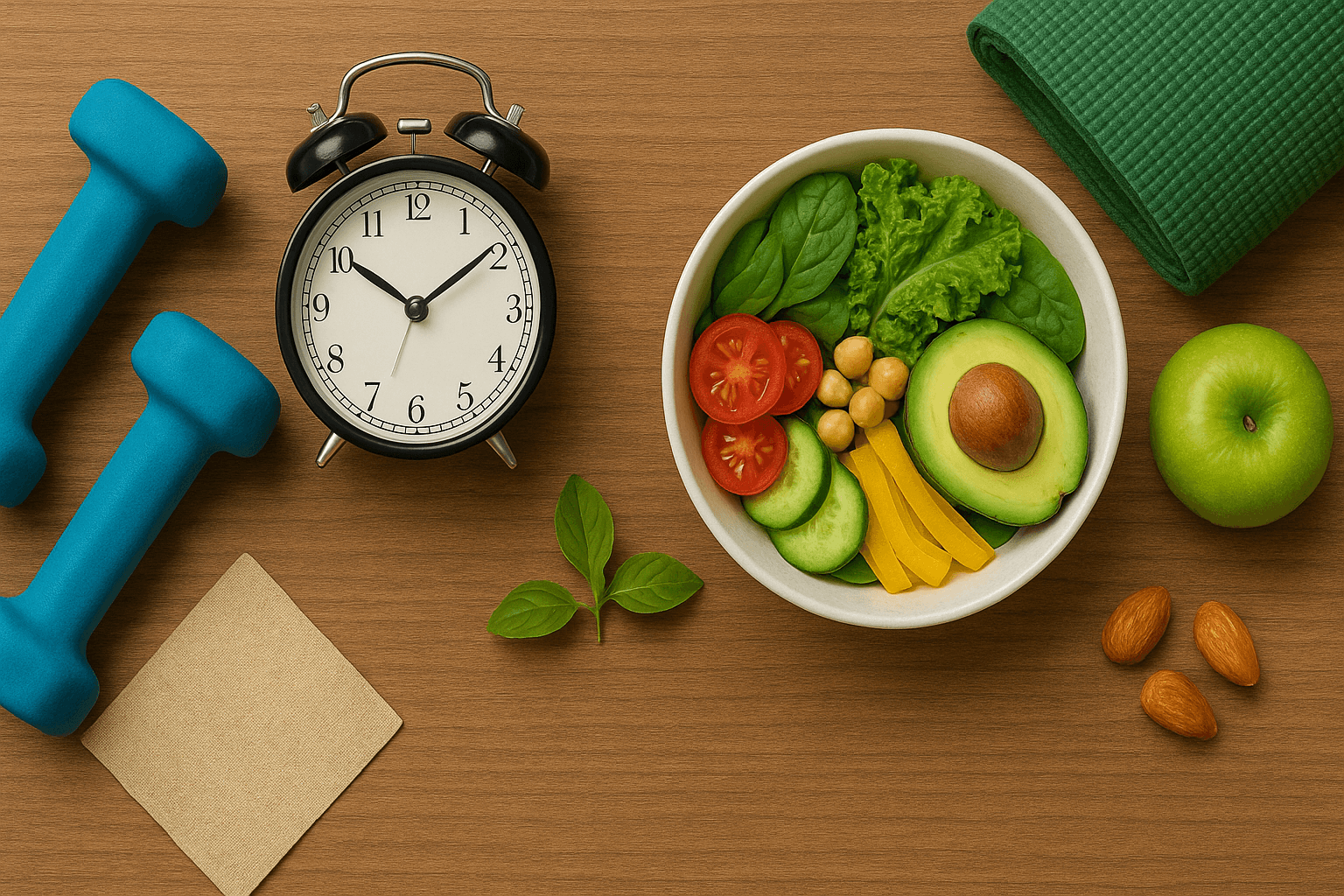Healthy Lifestyle Unlocked: Building Joy, Resilience, and Wellness One Habit at a Time
Published on July 23, 2025

What comes to mind when you hear the phrase “healthy lifestyle”? It could be a marathon runner zooming through the finish line, or a green smoothie drinker posed daintily in a sun-drenched kitchen. For others, it might be overwhelming — a never-ending to-do list of eat better, move more, stress less, sleep more, and somehow manage to do it all with a smile. But the truth of the matter is this: a truly healthy lifestyle is so much richer, more personal, and more joyful than any magazine headline or social media post would have you believe.
A healthy lifestyle is not just a matter of checking off boxes on a “should” list. It’s about living a life that is not only longer, but fuller, richer; more vibrant, more satisfying — and most important, connected to your own unique goals, your own individual values, and your own deepest happiness. It’s not a place you arrive at and are done with; it’s a road you’re on every single day, learning as you go and making adjustments when necessary. For an ardent lifelong learner (IT IS ALSO A TEACHER OF COURSE! nutrition, well-being, and making life meaningful, this much I know: every little thing you do does add up to something amazing.
What Counts as a Healthy Lifestyle?
A healthy way of life is not a series of dogmatic rules or check lists. It is a fluid, adaptive way of living that respects and acknowledges your body, mind and spirit as a holistic. It’s about the warp and weft of nourishing food, regular movement, restorative sleep, meaningful relationships and the strength and readiness to withstand whatever life delivers. The beauty? There is no one “right” way — your healthiest life is unique to you.
Nutrition as Nourishment, Not Punishment:
Eating well isn’t about white-knuckling and calorie counting your happiness away. It’s about making your plate — and your life — full of foods that are energizing, that sharpen the mind, and that make meals into a pleasure rather than a punishment.
Eat more plants: Fill your plate with colorful fruits and vegetables, whole grains, beans, nuts, and seeds. The more colors, the greater the variety of nutrients.
Keep it mixed up: Don’t have the same thing every day. Every food offers unique health benefits, flavors, and textures, and the variety keeps mealtime fun!
Balance, not perfection: There’s room for treats, celebrations and the foods that bring you closer to family, culture, or happy memories. Indeed, what matters is the big picture — what you eat most of the time, not what you eat for an occasional treat.
Dance as Leisure, Not Just Exercise:
Exercise is not a punishment for what you ate or a competition with others — it is your body’s way of existing more enjoyably, managing stress and sparking creativity. And the best part is, you don’t need a gym membership or fancy equipment.
Do something that you love: Take a walk or dance around your living room, take up gardening or play with your kids in the yard, go for a swim or stretch. The best exercise is the one you enjoy and will fit into your day.
Stay active: Even minimal amounts count. Take the stairs, park in the back of the lot, or perform a set of stretching exercises at your desk. All movement counts!
Celebrate the feeling: Consider how activity makes you feel stronger, more energetic, more proud of yourself.
Sleep as Restoration, Not Weakness:
So many people underestimate sleep, but it is as essential as nutrition or exercise. Sleep is the time when your body heals the muscles, balances hormones, and clears your mind.
Shoot for 7-9 hours per night: Quality is as important as quantity. Establish a soothing bedtime routine, dim the lights, and stay off screens before bed.
Make sleep a priority: You’ll find yourself more focused, less stressed out, and with stronger immune health — and sleep makes it so much easier to eat better and move more.
Stress Management as Self-Compassion:
Not only can chronic stress zap your energy, but if it’s left unchecked, those stress hormones can sabotage even your best weight loss efforts.
Build your toolkit: Mindfulness, deep breathing, meditation, journaling, or even just a walk can be useful.
Find what calms you: Is it art, music, quiet time with a pet or a good book?
Reach out: Don’t attempt to manage everything on your own. Talking about how you’re grappling can provide an entirely new perspective, whether you’re discussing it with a friend or a therapist.
Social Connection as a Superpower:
Connection is hardwired within us as human beings. Strong relationships give meaning, joy and resilience to life.
Eat together: Food is more nourishing — and more fun — when enjoyed with others.
Keep up connections: Whether family, friends, neighbors or community groups, connections make it easier to rebound from tough times and share the good ones.
Show your best side: Extend kindness, a helping hand and remember — you’re not alone.
Purpose and Passion – the pulse of wellness:
A sense of purpose infuses your life with energy, passion, and motivation at all times, even when things are hard.
You should find something, said Dr. Seppala, to set your spark: to do what brings you joy, to volunteer, to create, to learn something new if you can.
Break down what you want to achieve in small steps: Even if you can just make baby steps, a little progress can really give you a confidence and mood boost.
Find time for fun: Laughter, playfulness, and creativity aren’t indulgences — they’re necessities.
Constructing Your Wellness Lifestyle: The Power of Habits
Good news is that change never happens overnight. A healthy life is not built in a day but rather, it takes years of consistent choices being made daily. Here’s how to make it work for you:
Start Small:
Don’t attempt to fix it all at once. Choose one new habit — a glass of water in the morning, or a walk after dinner, or adding one new vegetable to lunch. Start there, and build up. Consistency matters more than intensity.
Stack Habits:
Tie a new habit to something you already do. Stretch while you’re waiting for coffee to brew, meal-plan while you make a shopping list, meditate immediately after you’ve brushed your teeth. It gets easier, the more you do it automatically.
Forgive Mistakes:
Everyone slips up. We all have missed workouts, takeout dinners and late nights. Don’t beat yourself up — simply right the ship at your next opportunity. Self-compassion is a superpower.
Track and Celebrate:
Observe and write about yourself moving forward, however slightly. Perhaps you cooked dinner with a new recipe, snuck in a walk during your lunch hour or refused a second helping. Celebrate your wins! Progress fuels motivation.
Get Support:
Share your goals with a friend or family member, join a walking group or link up with others online. You don’t need to go it alone. It brings accountability, encouragement and a feeling of belonging.
Living Well—A Day in the Life: Putting Healthy Habits to Work
Morning:
Do some stretching when you get up, down a large glass of water, and eat a satisfying breakfast (think oatmeal and fruit or eggs with veggies). Spend several minutes in stillness to set your intention for the day or to practice gratitude.
Midday:
Stagger work with a quick walk outside or a stretch. Lunch is bright and filling — maybe a bean salad, a sandwich on whole grain bread or a grain bowl filled with vegetables. If possible, take a bath in the sun to recharge.
Afternoon:
Nosh on something with some pep: fruit and nuts, yogurt, or veggie sticks. Take a few deep breaths, do a mini meditation, or give yourself a mindful moment before proceeding with your next task. Sneak in a bit of something you love — reading, music or a conversation with a friend.
Evening:
Shake that body — walk, dance, yoga, whatever brings a little bliss into your life. Prepare a home-cooked meal and share it with loved ones if you can. Unwind with calming activities and unplug screens an hour before going to bed. Record one beautiful thing or act you are grateful for when you go to bed at night.
Normal Hurdles—and How to Get Over Them
“I don’t have time.”
Begin with five- or ten-minute habits. Even a few minutes of stretching, meal prep or mindfulness count toward the total. Prepare large amounts of a few dishes when you are able; rely on easy meals and short bursts of movement. Take time for what matters most.
“My family isn’t on board.”
Change takes time. Demonstrate healthy habits, let others help with shopping or cooking and encourage participation without pressure. We can change our taste buds (and patterns) too. Look for points of agreement and cheer for small victories.
“I lose motivation.”
Consider how healthy habits make you feel, not just how they appear. Reflect on your “why.” Set small, attainable goals and reward progress — motivation typically follows action.
“I mess up and want to quit.”
Perfection doesn’t have anything to do with the equation for a healthy lifestyle. Everyone slips. The thing is to start over — every meal, every workout, every seven-minute break of mindfulness is a new opportunity to do our best.
The One Thing You Can Take Away: Your Life, Your Health
A wellbeing lifestyle isn’t a race, or a faultless checklist, but an invitation to help fuel more of your day to day energy, joy and meaning. And start small, and be nice to yourself. Never cease to be curious, and bend with the curveballs that your needs and life will throw at you. More than anything, keep in mind that your journey to health and happiness is an individual one. Make it one that fills your days with contentment, connection, and true pleasure.
You don’t have to be perfect to be healthy. You need progress and patience and a little bit of permission to live how you want to live. Each glass of water, each mindful meal, each laugh, each act of self-care is a step—each conscious meal, each time you chuckle, each time you take care of yourself.








